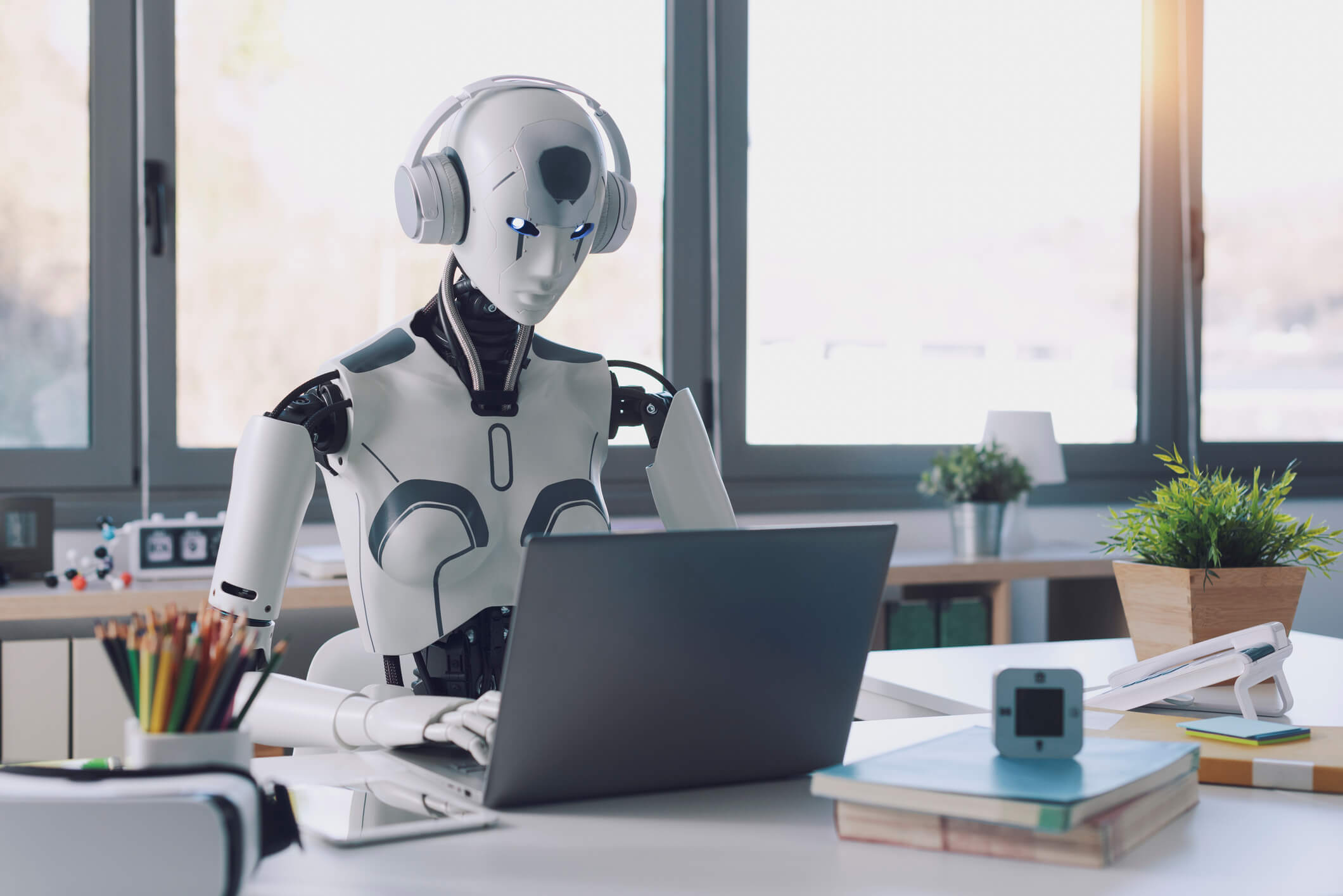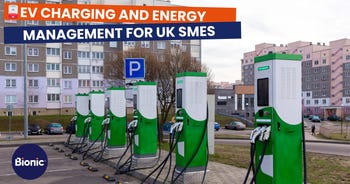How Can AI Help Companies Become More Energy Efficient?
Did you know that around 30% of all energy from businesses across the UK is wasted? In a time when sustainability has never been more important, discussions around energy efficiency and its significance for businesses worldwide are on the rise.
But what is the role of artificial intelligence in this green revolution, and how does it align with the global push towards Net Zero?
In this Bionic guide, we’ll explore what role AI can play in energy management. We’ll also provide practical examples of how machine learning can be a game-changer for companies working towards a more sustainable future.

Five-point summary
- AI machines and software can replicate human cognitive functions, including learning, reasoning, and problem-solving. Sustainability is crucial for businesses as it minimizes environmental impact, reduces waste, and enhances long-term economic resilience. But what about AI's role in sustainability?
- AI can help automate tasks in business energy management, assisting in grid stability, energy generation forecasting, demand response, energy storage optimisation, research, and market analysis.
- Businesses can use AI to monitor real-time energy usage, identify peak energy periods, reduce wastage, predict renewable energy patterns, track their carbon footprint, educate employees about sustainability, and optimise equipment maintenance.
- Essentially, adopting AI may seem costly, but it can help businesses to reduce costs while keeping sustainability and environmental responsibility front of mind.
What is artificial intelligence?
Artificial intelligence (AI) refers to the creation of machines and software that can mimic human cognitive functions like learning, reasoning, and problem-solving. Essentially, it's the science of training machines to understand and simulate human intelligence using code.
With AI, computers can sift through vast amounts of data, recognise patterns, and even make predictions or decisions based on that information. Many people consider AI and machine learning (ML) to be the same, but the two are slightly different. Machine learning specifically refers to the way that AI-coded machines can automatically adapt and evolve without humans getting involved.
Artificial intelligence has long been used by scientists and engineers in computers and machines, but in recent years, AI has become more widely available to the public. From AI voice assistants on mobile phones to self-driving cars, AI is helping to solve more everyday problems and is changing how we live and do business.
Why is sustainability important for businesses?
From an environmental perspective, sustainability means ensuring that the way we live and do business has minimal negative impact on the planet and we maintain its natural resources. For businesses specifically, this means adopting practices that reduce waste, manage resources efficiently, and minimise negative impacts on ecosystems to reduce our carbon footprint.
Sustainability isn’t just about ‘going green’ though. It also means having a model that can weather economic storms, respond to changing market dynamics, and stand firm against the tests of time.
Both aspects of sustainability mean helping the planet and businesses to endure difficult situations, which is why it should be a key aim for all corporations, from small businesses to large organisations.
What does it mean to be net zero?
Net zero is the state where the amount of greenhouse gases emitted into the atmosphere is balanced by the same amount being removed. Essentially, it's when a business offsets its carbon emissions entirely, leading to a net-zero carbon footprint.
Having a net-zero status is crucial in combating climate change, and it demonstrates that a company is not contributing to the increase in atmospheric CO2 levels. A business that strives for net zero shows a commitment to environmental preservation.
To learn more about how your business can take steps towards achieving this, read our guide to net zero here.
What is the role of AI in energy management?
There are several ways AI can help with energy management:
- Grid stability — The constantly changing and unpredictable nature of energy grids requires real-time monitoring and balancing to keep them running. AI can help keep the power grid stable by analysing data from various sources, predicting potential disruptions and outages, and making adjustments to maintain usage.
- Energy generation forecasting — Predicting when and how much energy will be produced, especially from natural renewable sources like wind and solar, can be difficult. AI algorithms can analyse past patterns, current conditions, and future predictions to provide accurate forecasts. With efficient plans in place, businesses can make sure they use the right amount of energy resources.
- Usage and demand response — Peak energy periods can have a knock-on effect on stability and cost, potentially causing disruption to businesses that need to operate during these periods. Artificial intelligence can review patterns in energy consumption and predict these peak periods. This allows companies to adjust their energy usage in response to grid demands, potentially reducing costs and removing stress on the energy system. Learn more about average business energy consumption here.
- Energy storage management — Optimising energy storage, such as by using batteries, is crucial for ensuring a steady energy supply. AI can monitor storage conditions, predict the best charging and discharging times, and maximise the lifespan and efficiency of energy storage systems.
- Research and development — AI may hold the key to increasing the pace of innovation in the energy sector. Whether it's by discovering new materials for better battery storage or bettering the design of wind turbine blades, AI-driven simulations and analysis can lead to breakthroughs faster than traditional research methods.
- Energy market cost fluctuations — The energy market is influenced by many factors, leading to price fluctuations. To help predict market shifts that can lead to these cost changes, AI can look at global trends, geopolitical events, and even weather patterns. With these insights, businesses can make informed buying or selling decisions, which can help to make their spending go further and capitalise on market opportunities.
How can businesses use AI to become more energy efficient?
Whether you’re a start-up organisation or expanding your businesses, there are plenty of ways you can use AI to help optimise your energy use and move towards a net zero status:
- Monitor real-time energy usage — Often, the larger a business, the more power it’s likely to use. Because of this, it can be crucial for bigger organisations to have a solid understanding of what their everyday consumption looks like. AI systems, like integrated sensors and smart thermostats, can give businesses a detailed and instant overview of how much electricity and gas is used. With this data, you can create automatic programs to adjust the temperature of your environment to reduce your usage and save money.
- Understand peak energy periods — Along with understanding which areas of business use the most power, predictive AI algorithms can analyse your historical data to determine when your energy usage peaks. With this insight, you can adapt the way you operate to reduce your energy consumption and costs. For example, suppose you run a business that operates shifts throughout the evening or in the early hours of the morning. In that case, you might benefit from switching to an off-peak tariff that charges a lower unit price for power during lower demand times of the day. You can learn more about this with our time-of-use tariffs guide.
- Identify areas of energy wastage — Similarly to understanding when your business uses a lot of energy, using AI to comb through data can pinpoint inefficiencies within your operations. It might be the case that your machinery is outdated and uses more energy than newer, more efficient models or that certain areas in your business are being over-cooled or overheated. Addressing these areas can help with energy and cost savings. Find out how you can conduct a business energy audit here.
- Predict renewable energy patterns — This is especially relevant for businesses who use solar or wind energy, as AI can help to forecast when these renewable sources will be most productive – or unproductive. If you have this insight, you can adapt your needs and operating patterns to align with renewable energy generation. This can help prevent unexpected weather conditions from bringing your business to a halt.
- Track carbon footprint — Part of reducing your carbon emissions is understanding exactly how you’re contributing to the build-up of greenhouse gases. Artificial intelligence can measure and monitor your company's emissions so that you have a way of benchmarking anything you try to minimise their environmental impact.
- Educate employees about sustainable practices — Artificial intelligence isn’t just useful for putting measures in place to directly reduce your energy output. It can also be used to help educate your staff on the importance of sustainability, the impact of their actions on consumption, and what measures they can take to reduce it. AI-powered analytics can create personalised training programmes tailored to a business, freeing up the time and money spent on any external training.
- Optimise equipment maintenance — Regular equipment maintenance makes for more efficient operations, as faulty or unreliable machinery can disrupt everyday workflow. AI can predict when machinery or systems are likely to fail or become less efficient, allowing businesses to carry out preventive maintenance and avoid energy wastage.
How can small businesses use AI to improve efficiency?
AI isn’t just for big tech companies. It can be a game changer for all kinds of small businesses, including hair salons, garages, pubs, and more. Here are some ways different businesses can start using AI in practical, helpful ways:
Hair salons
Possible uses of AI:
- Appointment scheduling - Using AI-powered scheduling tools can help you automate booking appointments, send reminders, and manage cancellations.
- Customer Relationship Management (CRM) - AI can help track customer preferences, purchase history, and feedback so you can offer personalised services.
- Virtual Assistants - Chatbots can handle customer inquiries, provide information about services, and possibly suggest hairstyles and colourings based on customers' previous preferences.
AI applications available to salons:
- Fresha - An all-in-one salon management software that includes AI-powered appointment scheduling, customer management, and marketing tools.
- StyleSeat - Uses AI to help clients find and book appointments with stylists, and provides tools for managing bookings and customer relationships.
Mechanic and garage services
Possible uses of AI:
- Predictive maintenance - AI can check vehicle data to help predict maintenance needs and prevent breakdowns.
- Inventory management - AI can check your inventory levels to make sure parts are available when needed without overstocking.
- Customer service - AI chatbots can help with booking appointments, answer commonly asked questions, and offer updates on service status.
AI applications available to mechanics and garage services:
- AutoLeap - An AI-driven auto repair shop management software that offers features like predictive maintenance, inventory management, and customer communication.
- Shopmonkey - Provides AI-powered tools for managing appointments, inventory, and customer interactions, helping to streamline operations.
Pubs
Possible uses of AI:
- Personalised marketing - AI can analyse stock inventory and customer data to create targeted marketing campaigns, offering promotions based on customer preferences.
- Inventory management - AI can help manage stock levels, predict demand based on sales data, and reduce waste by optimizing orders.
- Customer experience - AI can be used to gather feedback and analyze customer sentiment to improve service quality.
AI applications available to pubs:
- Toast - An AI-powered point-of-sale (POS) system designed for restaurants and pubs, offering features like inventory management, customer feedback analysis, and personalised marketing.
- Tock - Uses AI to manage reservations, optimise seating arrangements, and enhance customer experience through personalised recommendations.
General benefits of AI for small businesses
- Automation of Routine Tasks - AI can handle repetitive tasks like data entry. This can free up time to spend running your business.
- Enhanced Security - AI-powered security systems can detect and respond to threats more effectively.
- Improved Decision Making - AI can analyse business data to provide insights and support better decision-making.
AI applications available to small businesses:
- HubSpot - Offers a suite of AI-driven tools for sales, marketing, and customer service, including chatbots, CRM, and analytics.
- Zoho Zia - An AI assistant integrated into Zoho's suite of business applications, helping with sales, marketing, and customer support.
- Grammarly - An AI-powered writing assistant that helps improve communication by checking grammar, tone, and style.
- Jasper AI - An AI content creation tool that can help with writing marketing copy, blog posts, and social media content.
- Otter.ai - An AI meeting assistant that transcribes meetings, generates summaries, and helps with note-taking.
Implementing AI can help small businesses become more efficient, cut costs, and offer customers a better experience.
Understanding business energy with Bionic
AI can be an incredibly useful way for businesses to reduce costs and, at the same time, champion sustainability and environmental responsibility.
If you need more advice or to understand more about business energy, visit our energy guide pages for more information. Or, get in touch today with the Bionic team to compare your business energy needs.








